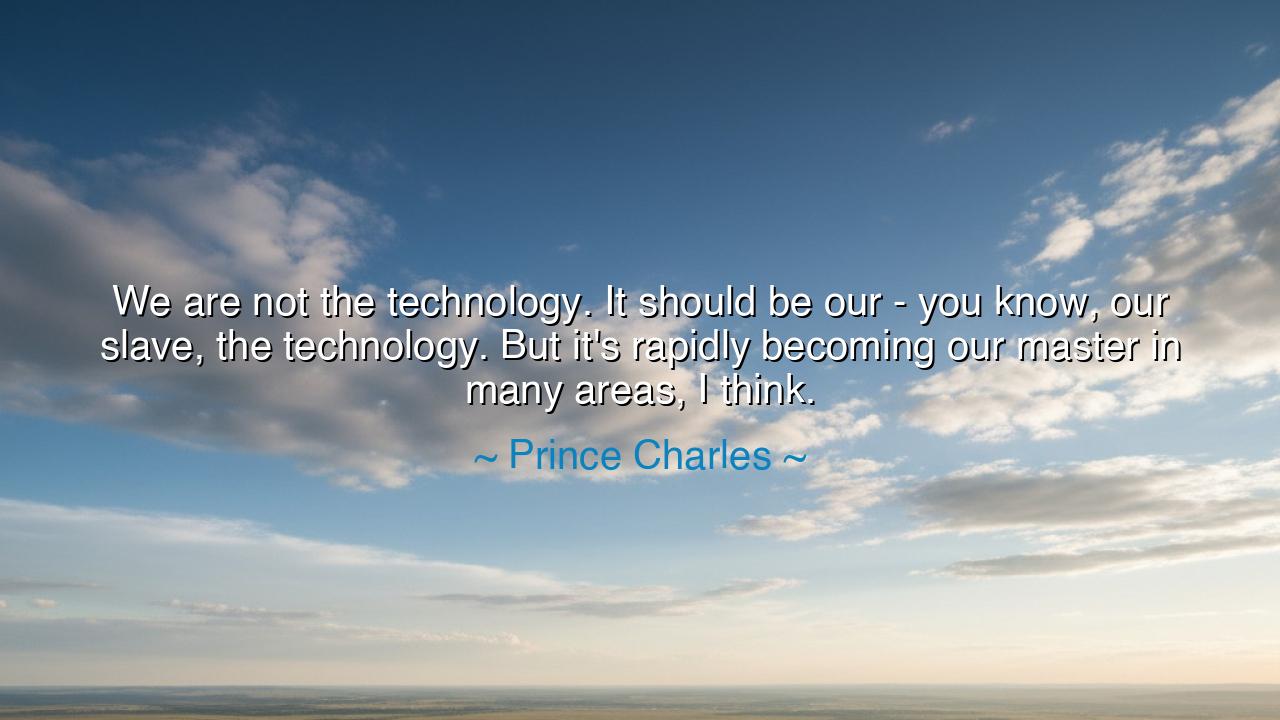
We are not the technology. It should be our - you know, our
We are not the technology. It should be our - you know, our slave, the technology. But it's rapidly becoming our master in many areas, I think.






Hear these words of Prince Charles, grave and prophetic: “We are not the technology. It should be our slave, the technology. But it is rapidly becoming our master in many areas, I think.” Within this utterance lies not mere caution, but a cry of warning, as though a watchman upon the walls beheld a shadow rising beyond the horizon. For what was fashioned by the hands of man, meant to serve his toil and lighten his burden, now threatens to sit upon his throne and govern his days.
From the dawn of ages, humanity has bent the world to its use. Fire, once feared, became the servant of warmth and cooking. The plow, once unknown, made the earth yield its treasures. The wheel carried us farther, the press spread our words, the engine powered our industries. Always the same pattern: invention bowing to the will of its creator. Yet now, in the age of circuits and screens, of algorithms and vast networks, the pattern begins to falter. The servant grows mighty, and the master grows forgetful of his command.
Consider the tale of the sorcerer’s apprentice, immortalized by Goethe. The apprentice, desiring ease, called upon enchantment to fetch water. At first the magic served faithfully, but soon it grew wild, pouring forth floods beyond control. What was meant to be a helper became a force of destruction, because the hand that summoned it had not the wisdom to govern it. So too with technology today: in our haste to embrace convenience, we risk becoming enslaved to the very systems meant to aid us.
History offers its own lessons. In Rome, the people became enthralled by the spectacles of the Colosseum. The games, once mere diversion, grew into a force that dulled the citizens, drawing their attention away from the decline of the Republic. Bread and circus became their master, and the empire itself rotted within. In our age, the glowing screens may well be our new arena. The time once given to thought, to labor, to conversation, is consumed by endless distraction. Thus, what we shaped to serve us now rules us with invisible chains.
Prince Charles speaks as a voice of remembrance. He reminds us: “We are not the technology.” We are flesh, spirit, and soul. The machines we create are tools, not gods. Yet when we bow before them, when we let them decide how we think, how we spend our hours, how we relate to one another, then we have surrendered our sovereignty. The master has become the slave, and the slave the master. This is not progress, but inversion.
The lesson, then, is urgent: we must reclaim dominion over our creations. Let technology remain the plow in the field, not the hand upon the reins. Use it to extend your wisdom, not to diminish it. Use it to strengthen community, not to replace it. Just as the warrior must know when to sheathe his sword, so too must the modern man know when to silence his devices. For he who cannot rule his tools has already yielded his crown.
Practical wisdom lies before you: Set boundaries for your machines. Let there be hours of stillness where no screen commands your gaze. When you eat, let the meal be sacred, unbroken by the hum of devices. When you labor, use the tools of technology with purpose, but never forget that you are the craftsman, not the crafted. When you rest, seek the embrace of nature, for the earth has been a truer master of man than any machine ever shall be.
Thus, remember this teaching, O children of the future: the greatness of humanity is not in what it builds, but in how it rules what it has built. If you would remain free, let technology serve as your servant, not your lord. Stand as master over your tools, lest one day you awaken to find that the crown has slipped from your brow, and your own creation commands the throne that was always meant to be yours.






AAdministratorAdministrator
Welcome, honored guests. Please leave a comment, we will respond soon